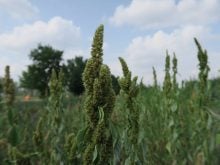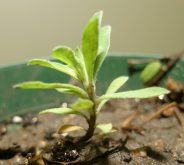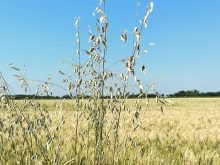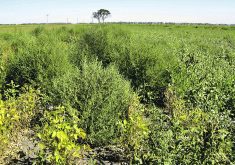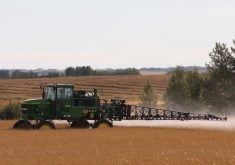Glyphosate-resistant kochia is spreading across southern Manitoba. So this spring more kochia weeds will survive the first herbicide treatment and more growers will want to know: did the sprayer miss this patch of weeds, or are they resistant to glyphosate?
A rapid test is now available to answer that question.
“I just spent money to do this (test) two days ago,” said Rob Gulden, a University of Manitoba weed scientist.
Gulden explained that Pest Surveillance Initiative (PSI), a Winnipeg company, uses a DNA-based test to determine if kochia is resistant to glyphosate.
Read Also

Agri-business and farms front and centre for Alberta’s Open Farm Days
Open Farm Days continues to enjoy success in its 14th year running, as Alberta farms and agri-businesses were showcased to increase awareness on how food gets to the dinner plate.
A grower sends in a sample of a weed and the result helps the producer decide, during the growing season, what to do next.
“If your glyphosate fails on kochia (and) you’re not sure if it was an application issue or it was resistance … you can get that confirmed before you go out with a second application of glyphosate and make the whole situation even worse,” Gulden said from his U of M office. “(It) allows you to get a result within a few days (or longer) and you can figure out what’s going on.”
Glyphosate-resistant kochia first appeared in Manitoba’s Red River Valley several years ago and the pest has spread to many other fields.
Most of the municipalities in the Red River Valley and south-central Manitoba now have it, along with two rural municipalities in the southwestern corner of the province.
One thing growers should be doing is scouting for kochia plants that may be resistant, said Tammy Jones, Manitoba Agriculture weed specialist.
If there is a patch in a field, producers should hand-pull the kochia or consider spot tillage to remove the weeds.
The test used at PSI is part of a new suite of molecular tests for herbicide resistance. Scientists are using molecular markers, or fragments of DNA found at certain locations in the genome, to confirm if a weed is resistant.
This winter Agriculture Canada announced that such tests are being used in Quebec to combat herbicide resistance.
“With just a few fresh leaves from a weed plant, a technician can determine whether resistance genes are present in less than two weeks,” said Martin Laforest, a scientist at the Ag Canada research centre in Saint-Jean-sur-Richelieu, Que.
The DNA-based tests are helpful but they have limitations.
For instance, the test for kochia is only for kochia and only looks for a particular mechanism, in the plant, which causes resistance to glyphosate.
So, the same test can’t be used for a different herbicide or a different weed.
“They are very specific to species (of weed) and specific to resistance mechanism,” Gulden said.
That means scientists still need the old method of testing — where weed samples are grown in a greenhouse and then sprayed with a particular product — to see if a herbicide kills a weed or not.
“(The old test) will help us in detecting new mechanisms (for resistance),” Gulden said. “These new tools are really nice, in season, to look at what’s going on … before the weeds produce seed.”




